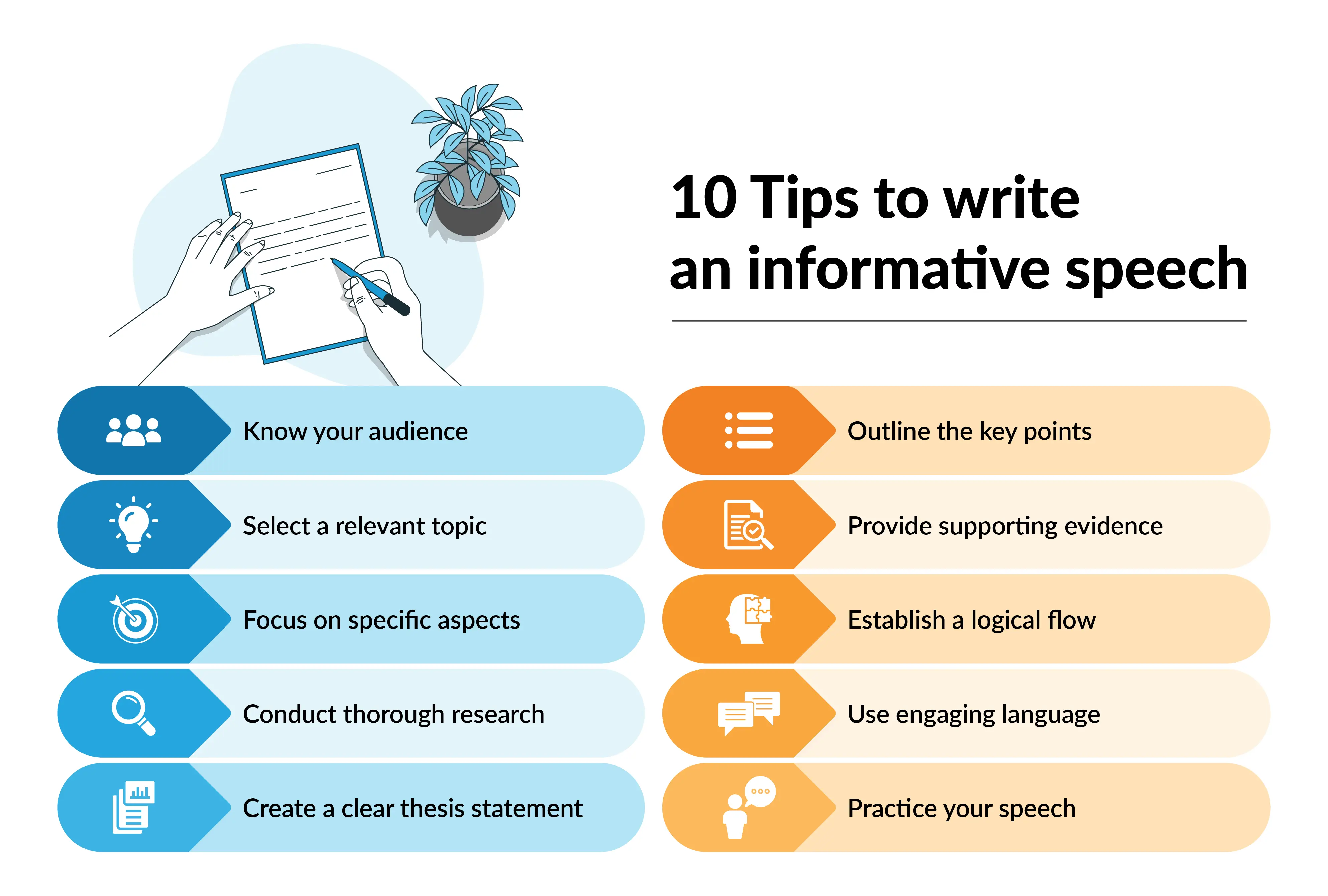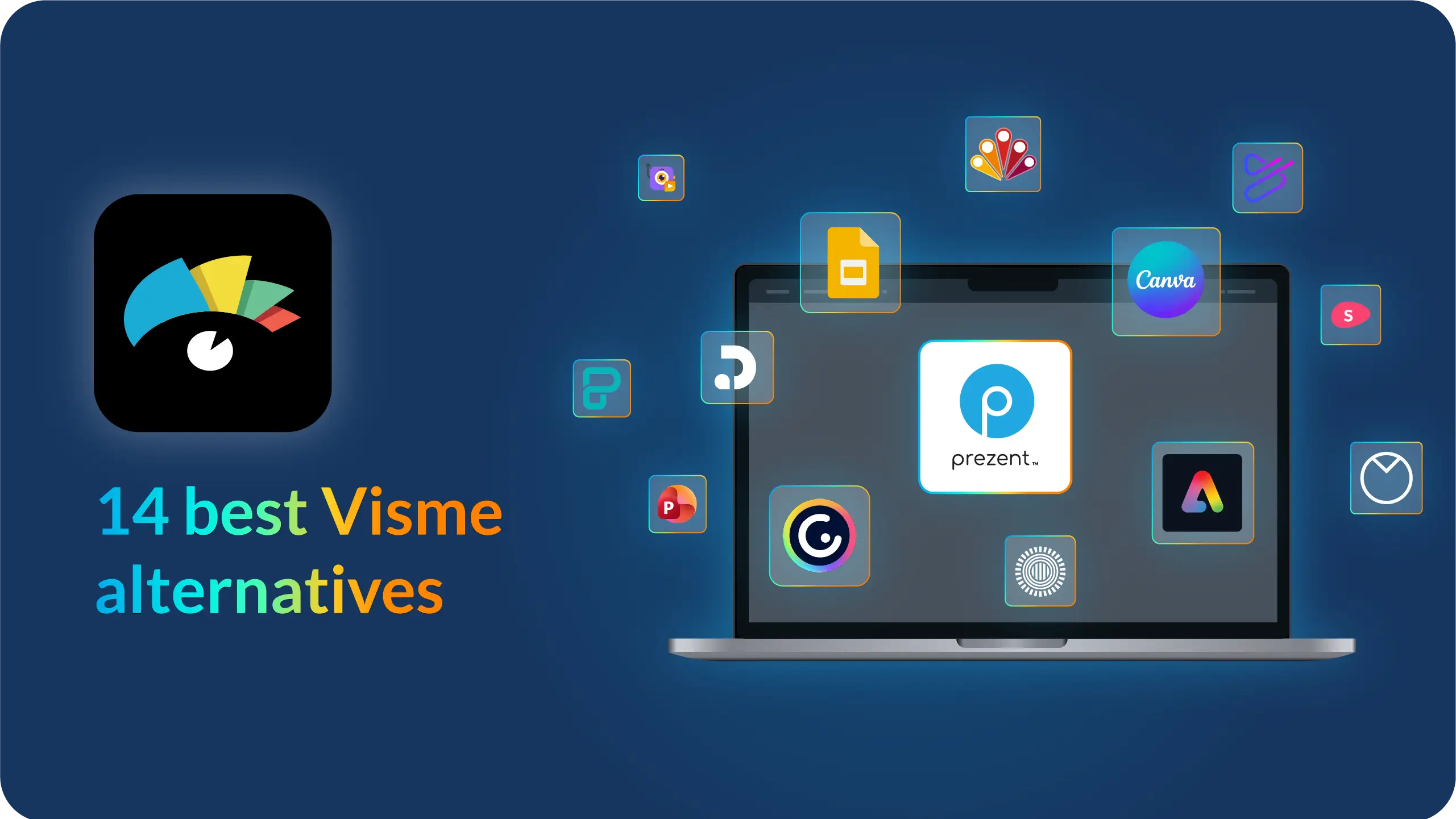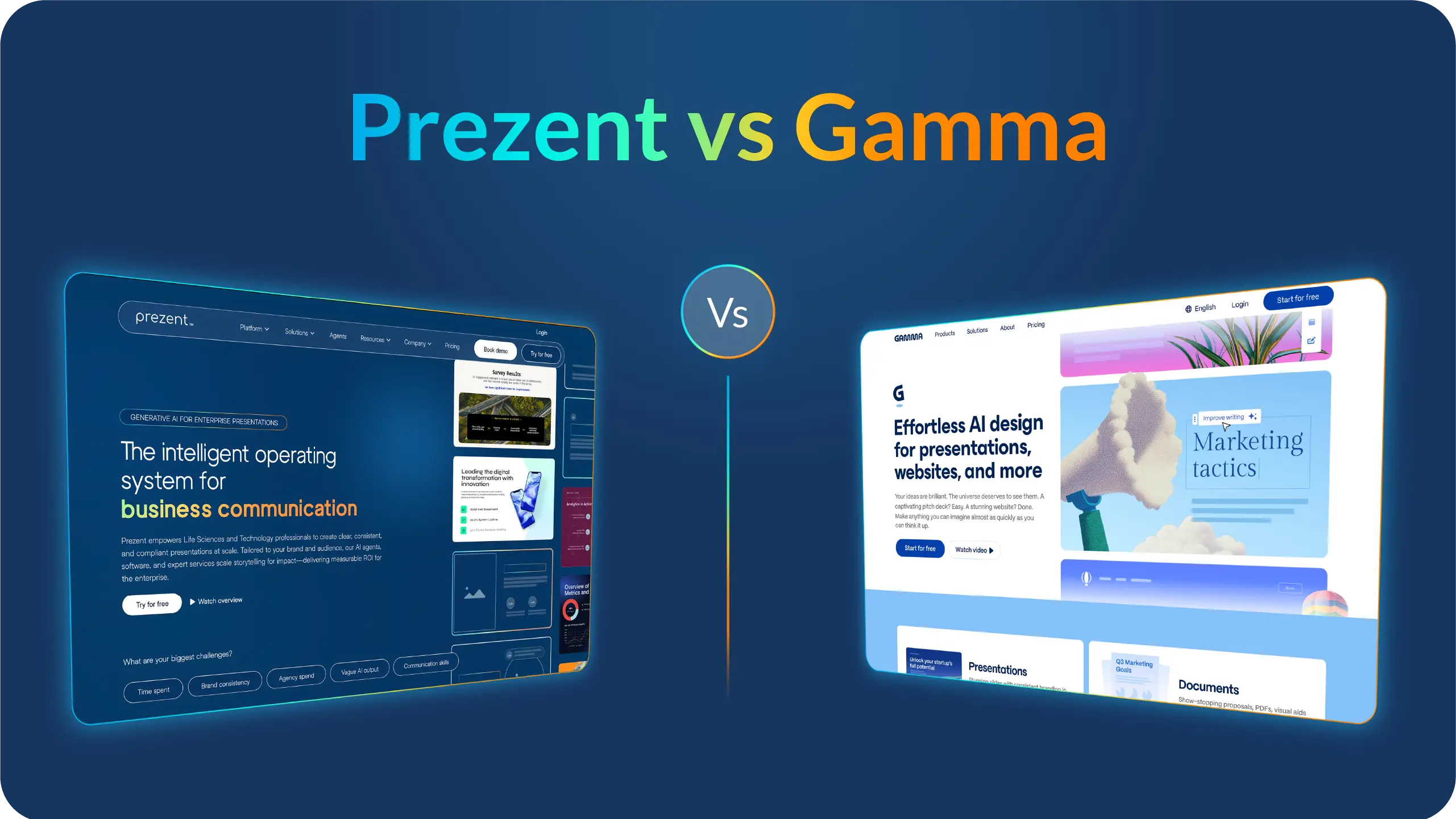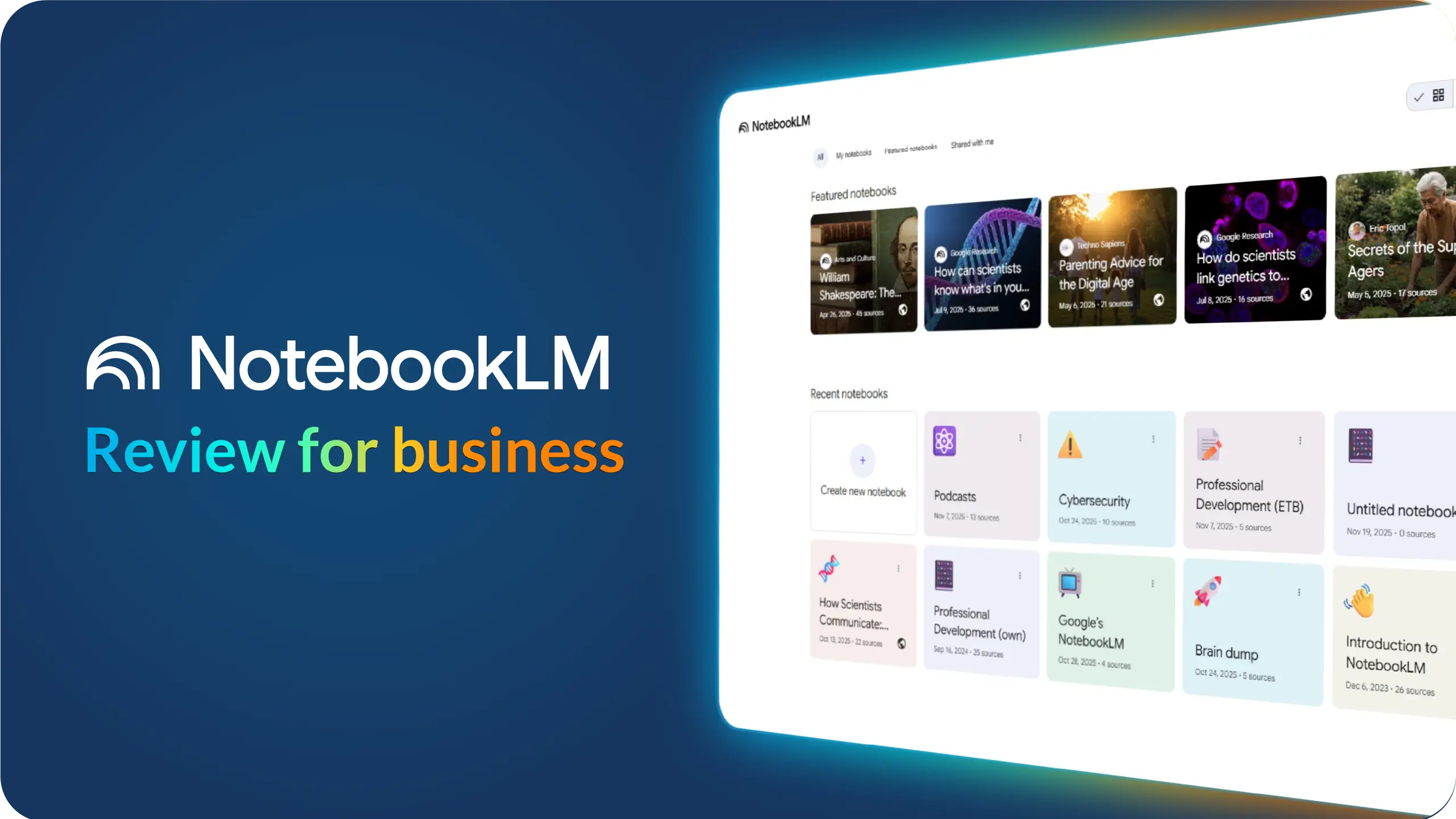100 Informative speech topics to engage your audience in 2026

Do you need help choosing the perfect topic for a speech or presentation at work? It can be overwhelming when you want to leave your audience feeling informed and inspired. Choosing the right topic is half the battle won. Here are 100 informative speech topics to help you prepare for your next public speech. From AI-based speech topic ideas to collaborative and unique issues, this article will help provide ideas for you to create your next informative speech.
This article will also explore the critical elements of an informative speech, how to choose the right topic and provide tips for delivering a talk that leaves a lasting impression. Let's dive in!
What exactly is an informative speech?
An informative speech presents an opportunity to educate the audience about a specific topic in a clear, captivating way.
The main goal of an informative speech topic is to impart knowledge without persuading the audience, i.e., a speech that informs the audience about the subject. For example, when speaking about "The role of AI in drug development," the purpose of your speech should showcase how AI is revolutionizing the industry by explaining the process, showcasing real-life examples, and exploring potential future advancements.
On the other hand, a persuasive speech topic is more than just presenting facts. It’s about urging the audience to consider your point of view and take specific actions based on your message.

The role of public speaking in speeches and its benefits
Public speaking is the basis for delivering any speech in a workplace setting. It can be daunting. Some employees may shiver at the thought of addressing a large audience. Yet, informative speech topics enable individuals to showcase their subject knowledge.
The effectiveness of a speech depends on how you make your speech more intriguing and convey complex information in a way that is easy to understand. Let's take a closer look at the role of public speaking in giving speeches at work.
1. Provides clarity on the subject
Public speaking allows you to break complex topics into easily understandable segments. A good speaker uses pacing, tone, and pauses to ensure the audience absorbs the information comfortably. If the subject is too complex, the speaker can provide additional explanations, use examples, or rephrase points to make them easier to understand. Effective public speaking can transform even the most technical topics into clear, actionable insights.
For example:
During a company-wide meeting, a project manager explains a new software tool that will be implemented soon. Instead of overwhelming the team with technical jargon, the manager should use simple language, clear visuals, and take pauses where necessary. This ensures that everyone (technical and non-technical employees) understands how to use the new software tool effectively.
2. Enhances audience engagement
Skilled public speakers use rhetorical questions, storytelling techniques, and humor to engage the audience. By connecting with the audience personally, speakers can make potential topics more relatable and memorable. A two-way communication or a Q&A session can help the audience understand the subject better since the speaker can clarify doubts or expand on specific points. When your speech includes visual support, using a pitch deck creator can help you organize your ideas into compelling slides that further enhance audience engagement.
For example:
A team leader giving a speech on improving productivity can use storytelling to explain how another team overcame a challenging situation by working together. The leader can keep the audience engaged by adding humor and personal anecdotes, making the speech relatable and inspiring to the employees.
3. Builds credibility
A strong public speaking presence can help establish authority on a subject. Confidence, clear articulation, and mastery of the message will increase a speaker’s credibility. This allows the audience to trust the information being shared. This is important in informative speaking, where the goal is to educate or inform an audience.
For example:
A senior HR executive is presenting the benefits of a new employee wellness program. When HR exudes confidence by explaining the research behind the initiative, the employees are more likely to get on board with the idea quickly. When HR cites data from company surveys and case studies, it establishes the team’s authority and reassures the employees that the program will be beneficial.
4. Professional growth
This type of speech allows employees to explore topics outside their usual tasks, promoting ongoing learning and career growth. In addition to researching varied topics, hearing about new ideas or perspectives from other team members can spark creativity, leading to innovative solutions within the workplace. Delivering speeches helps employees build confidence in their knowledge and presentation abilities.
For example:
During a team meeting, an employee presents a detailed speech on other companies' innovative approaches to reducing their carbon footprint. This sparks the team’s interest in exploring eco-friendly initiatives within their organization and boosts the presenter's confidence for future speeches.
5. Aids in problem-solving
Informative presentations addressing industry challenges or case studies can inspire employees to apply similar problem-solving techniques to their tasks.
For example:
A team leader delivers an insightful presentation on how a competitor successfully resolved a significant supply chain issue. The team can now implement similar strategies to address their supply chain challenges.
Keeping the audience engaged through a speech can genuinely transform the workplace. Engaging in informative speeches can nurture a culture of continuous learning, teamwork, and effective communication among employees, ultimately leading to achieving organizational goals.
Different types of informative speech topics
This type of speech can be broadly categorized based on the purpose and the kind of information you intend to share with your audience. Some of the main types include:
- Definitional: These topics explain what something is by defining terms or concepts.
- For example, a speech about "What is a pitch deck?" helps clarify and explain the idea to the audience.
- Descriptive: These speeches provide a detailed description of a person, place, event, or thing.
- For example, a speech titled "The art of storytelling in speeches" describes the importance of storytelling in speeches.
- Process or 'how-to': These speeches demonstrate how to perform a task or explain a process step-by-step.
- For example, a speech on "How to write a perfect executive summary?" describes the step-by-step method of creating an executive summary.
- Compare and contrast: These topics explore the differences and similarities between two or more subjects.
- For example, informative presentations could include the topic "Formal vs informal presentations: which is better?"
- Explanatory: This informative speech aims to educate the audience on how something works or why something happens.
- For example, "How does climate change affect ocean currents?" is an explanatory topic.
- Cause and effect: These speeches explain the cause of a particular event or phenomenon and its effects.
- For example, "The causes and effects of global warming" is a cause-and-effect topic.
How do you choose an informative speech topic?
Choosing the right speech topic involves understanding your audience, aligning with the context, and considering your expertise. It is a simple formula to follow. Ask yourself these three questions before you jump into your speech writing process and choose a topic:
1. How well do I know the subject?
Your audience needs to see you as someone who knows what you're talking about. Knowing your topic well will help you explain the difficult parts and make you feel more confident during the Q&A.
2. Am I excited about the topic/message?
The tone of voice, eye contact, and body language will showcase your enthusiasm for the topic. If you're passionate about the subject, you'll connect with the audience better and make your speech more interesting.
3. Will the audience care about the topic?
If the audience doesn't see how they can learn something valuable from your topic, they might not be interested. It's best to avoid topics with little value or too much complexity. Remember, your speech needs to offer something worthwhile to the audience.

100 Good informative speech ideas for the workplace
Detailed speeches in the workplace provide an opportunity to educate and inspire peers on topics that drive business results. Whether you're explaining new policies, sharing industry trends, or providing insights on team dynamics, engaging informative speech topics can enhance understanding and productivity across departments. Dive into the list of informative speeches below.
1. AI-based topics
AI is changing the modern workplace by increasing efficiency, improving performance, and empowering businesses to make more intelligent decisions. AI revolutionizes organizations' functions, from automating repetitive tasks to offering valuable insights through data analysis. These speech topics concentrate on how AI simplifies work and enhances productivity in business environments.
- How is AI automating routine tasks to improve workplace efficiency?
- The role of AI in predictive analytics for better decision-making
- How AI-driven chatbots are transforming customer service operations
- Enhancing employee productivity through AI-powered tools
- The impact of machine learning on business performance optimization
- How is AI revolutionizing recruitment and talent acquisition?
- Using AI for real-time performance tracking and reporting
- How is AI-powered cybersecurity protecting corporate data?
- The role of AI in driving personalized marketing strategies
- How can AI help businesses improve supply chain efficiency?
2. Business ethics and compliance topics
Informative speech topics related to business ethics and compliance help build trust, transparency, and legal integrity in the workplace. These areas focus on ensuring that organizations uphold ethical standards, foster a positive corporate culture, and safeguard the company's reputation. Check out some exciting topic ideas:
- The importance of ethical behavior in business
- Understanding the implications of fraud in the workplace
- The role of compliance in risk management
- How to create an ethical workplace culture
- The impact of corporate governance on business performance
- Understanding intellectual property rights
- The significance of transparency in business operations
- Strategies for ethical decision-making
- The role of whistleblowing in corporate ethics
- Trends in business regulation and compliance
3. Customer service and experience topics
Customer service and experiences are essential for building lasting relationships and fostering customer loyalty. These topics discuss ways to improve the customer experience, solve any problems, and provide good service that goes above and beyond what customers expect. This helps organizational success in the long run. Here are some of the topics you can use:
- The importance of customer service in business success
- Strategies for improving customer experience
- The role of feedback in enhancing customer service
- Understanding the customer journey
- Techniques for effective complaint resolution
- How technology is changing customer service
- The impact of personalization on customer loyalty
- Trends in customer service automation
- Best practices for training customer service representatives
- The role of empathy in customer interactions
4. Entrepreneurship speech topics
When it comes to speech topics on entrepreneurship, it’s a lot about innovation, resilience, and taking calculated risks to expand a business. These topics are designed to inspire and educate individuals about the skills, challenges, and mindset needed to grow successful ventures. Check out these topics that are incredibly relevant in today’s business world:
- How to write a business plan
- Understanding the startup funding landscape
- The role of networking in entrepreneurship
- Common challenges faced by new businesses
- The importance of market validation for startups
- How to pivot your business model
- Strategies for effective time management as an entrepreneur
- Tips for effective pitching to investors
- Key traits of successful entrepreneurs and how to develop them
- How to scale your business from startup to enterprise
5. Human resources and employee development topics
Human resources and employee development are crucial to creating a productive and engaged workforce. These topics offer ideas for talent acquisition, leadership enhancement, and creating growth opportunities. These speech topics could help retain top talent and nurture a thriving organizational culture. Check them out here:
- The importance of diversity and inclusion in the workplace
- Strategies for effective employee engagement
- The role of performance reviews in employee growth
- How to create a positive workplace culture
- The benefits of continuous learning and development
- Effective onboarding practices for new employees
- The impact of workplace wellness programs
- Understanding employee rights and workplace laws
- Techniques for effective communication in HR
- The future of work: trends and predictions
6. Leadership presentation topics
Effective leadership is crucial for leading teams, motivating action, and fostering business expansion. Presentations on workplace leadership concentrate on developing the abilities, attitudes, and approaches required to become a successful leader in a constantly changing business setting. Here are some topic ideas:
- The importance of emotional intelligence in leadership
- How to lead through change and uncertainty
- Building a resilient leadership mindset for challenging times
- The power of servant leadership in modern business
- Fostering innovation through transformational leadership
- The role of transparency and communication in effective leadership
- Developing future leaders through mentorship and coaching
- How leaders can cultivate a culture of accountability and trust
- Leadership strategies for navigating difficult conversations
- Leading by example: The impact of integrity on organizational success
7. Marketing and branding topics
Marketing and branding are essential for driving business growth and establishing a strong presence in the market. Speech topics on these subjects involve innovative marketing methods, brand strategies, engaging customers, etc. Explore some of the articles here:
- The significance of brand storytelling
- How to conduct effective market research
- The role of social media in brand awareness
- Strategies for successful email marketing
- The impact of influencer marketing on consumer behavior
- Understanding consumer psychology in marketing
- How to turn leaders into brand ambassadors
- The importance of customer feedback in branding
- How to use data analytics to improve marketing campaigns
- Role of customer-centricity in B2B marketing
8. Motivational speech topics
Workplace motivational speeches inspire employees to perform at their best, overcome challenges, and reach their potential. These topics focus on providing practical guidance and encouragement to help teams stay engaged, productive, and aligned with the company’s vision, especially during times of change or high pressure.
- How to stay motivated and focused in a fast-paced work environment
- The power of perseverance: Overcoming obstacles in your career
- How setting personal goals can lead to professional success
- The importance of resilience in achieving long-term success
- How can a positive mindset drive workplace productivity?
- Motivating teams through recognition and celebration of success
- How continuous learning can keep you engaged in your role
- The role of passion in building a fulfilling career
- Staying motivated in the face of change and uncertainty
- How to inspire others by leading with purpose and authenticity
9. Remote work productivity topics
With more people working from home, it's essential to help teams stay focused and work well together. These talks offer advice on staying productive, collaborating effectively, and creating a good work environment while balancing work and personal life.
- How to maintain productivity while working remotely
- Tools and apps to enhance remote work efficiency
- Time management techniques for remote employees
- How to balance work-life boundaries in a remote setting
- Overcoming communication challenges in remote teams
- How to create a productive remote work environment
- The role of leadership in boosting remote work productivity
- How to stay engaged and motivated while working from home
- Best practices for virtual team collaboration
- How remote work is reshaping workplace productivity trends
10. Sales techniques and strategies topic ideas
Knowing how to make sales and keep customers happy is key to making money and succeeding in business. These topics cover understanding what customers need, building good relationships, and using data to make sales and grow the business in the long run.
- The psychology behind successful sales techniques
- Strategies for building customer relationships
- How to use data and analytics to improve sales performance
- The role of CRM systems in sales management
- How to close deals more effectively using consultative selling
- The role of active listening in enhancing sales conversations
- The importance of follow-up in maintaining customer relationships
- How to handle objections in sales
- The importance of follow-up in the sales process
- How to leverage customer testimonials for sales

10 Tips to write unique informative speeches
Any speech at work should be engaging and ensure that your message reaches the audience effectively. To do that, structure your speech using the tips below to create an interesting and informative speech:
- Know your audience: Consider who will listen to your speech and their interests, needs, or knowledge levels. Based on that, you can pick essay topics to educate your audience accordingly.
- Select a relevant topic: Pick an informative speech topic that aligns with your audience's needs and holds value in their professional or personal lives.
- Focus on specific aspects: Avoid broad topics by focusing on a particular subject to make the speech manageable and engaging. Your message needs to resonate with your audience.
- Conduct thorough research: Gather credible information, statistics, and examples to support your key points and give your speech authority.
- Create a clear thesis statement: Keep your speech clear. Identify the central idea or message you want to convey in your speech to give it structure and focus.
- Outline the key points: Divide the topic into 2-3 main sections, each addressing different angles or aspects of the subject.
- Provide supporting evidence: Include facts, data, anecdotes, or case studies that reinforce your points and help the audience understand your message.
- Establish a logical flow: Ensure that your speech follows a coherent structure with an introduction, body, and conclusion, making it easy for the audience to follow.
- Use engaging language: Captivate your audience and write your speech to capture attention using relatable examples, rhetorical questions, or appropriate humor.
- Practice your speech: Rehearse your speech multiple times to smooth out rough areas and ensure you deliver the content confidently. Be aware of the length of your speech and stick to the given timelines.
FAQ's
1. How do I choose a good informative speech topic in 2026?
When selecting a topic for an informative speech in 2026, consider current trends, your interests, and the audience's knowledge level. Aim for topics that are relevant, engaging, and easy to research.
2. What are some creative informative speech topics for students?
Students can explore topics like media literacy, the impact of social media on mental health, or how AI is transforming education. These topics encourage creativity and are great for sparking thoughtful discussions.
3. How can I make a speech on mental well-being engaging?
To give an informative speech on mental well-being, focus on relatable issues like stress management or the importance of work-life balance. Personal anecdotes and practical advice can keep the audience engaged.
4. What is the difference between an explanatory speech and a descriptive speech?
An explanatory speech focuses on clarifying complex ideas or processes, while a descriptive speech emphasizes painting a vivid picture of a topic through detailed descriptions.
5. What are some fun and easy informative speech topics?
Fun and easy topics could include the evolution of memes, the science behind laughter, or how board games can enhance cognitive skills. These topics offer a lighthearted approach to public speaking.
6. How can I brainstorm fun informative speech topics?
To brainstorm fun informative speech topics, think about your interests, recent trends, and the audience's preferences. Ideas like quirky hobbies, pop culture phenomena, or humorous science facts can make a presentation both enjoyable and informative.
7. How do I choose a public speaking topic that balances complexity and audience interest?
When choosing a speech topic, consider how complex ideas can be broken down to match your audience’s knowledge level. For example, topics on psychology or mental health can be simplified through relatable examples and personal stories to maintain engagement.
How can Prezent help you with your speech topics?
When speaking in public, creating a speech that engages and enlightens them is vital. Keeping the audience involved through visual aids or presentations can further enhance the message to the audience. There are many ways to make a speech more enjoyable using presentation features.
Prezent offers many helpful features to develop your informative speech presentations. Let's explore how Prezent can help you create informative presentation topics:
- Instant templates: Prezent provides pre-designed templates and presentation decks that can inspire your topics for your next speech. These templates can help you quickly organize your thoughts and ideas, making your speech more effective.
- Customizable content for audience: Using the Communication Fingerprint feature, you can customize your presentations for a specific audience. With customizable themes, you can personalize your presentation to fit the tone and style of your speech. Whether you want a professional look or a more creative approach, you can make your presentations more engaging and memorable using Prezent.
- Structured storylines: Prezent offers over 10,000+ pre-curated storylines to help you create a clear and informative narrative. These storylines can help you organize your speech logically, ensuring your argument flows smoothly from start to finish.
- Prezentation Library: This feature allows you to collaborate with colleagues or mentors to improve your presentation on the speech topic. You can gather feedback, share presentation ideas, and edit in real time, ensuring your topic is well-developed before delivery.
Prezent is more than just presentation software; it is a comprehensive tool that supports every step of developing and delivering an impressive speech.
From organizing your ideas to enhancing visual appeal and encouraging collaboration, Prezent offers features that empower you to create captivating, well-organized presentations that persuade your audience.

Sign up for a free trial or book an expert demo to see how Prezent works.




.png)








